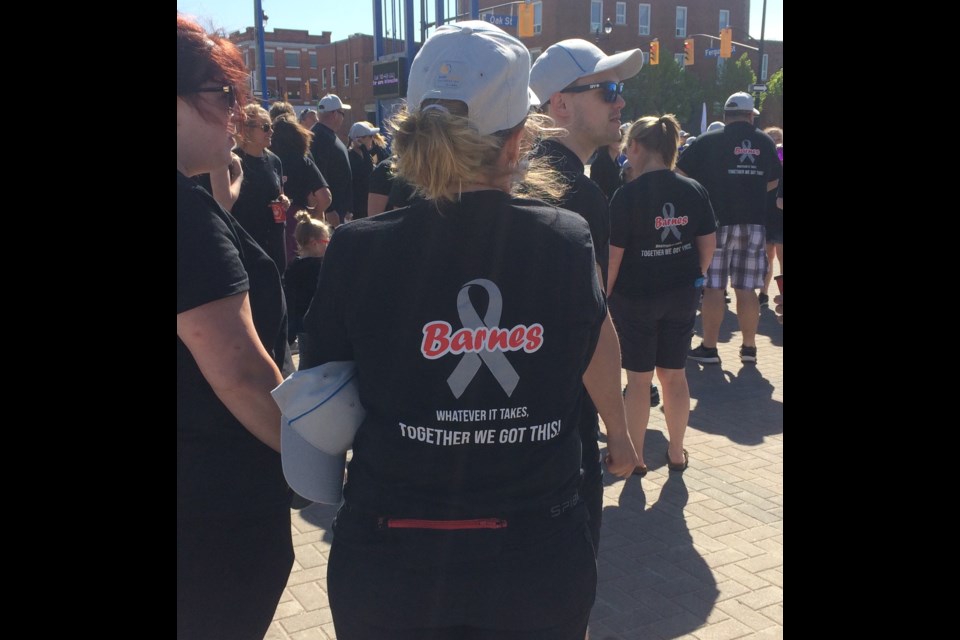It is estimated that every day in Canada, an average of 27 people will receive a brain tumour diagnosis.
North Bay’s Rob Barnes is one of those Canadians.
The father of three was 47 years old when he received his stage-four diagnosis on May 31, 2018.
He continues to wage a battle against Glioblastoma, a particularly aggressive form of brain cancer.
“I had blurred vision, no coordination, unsteadiness, and a headache. I was at work at the time and asked one of my co-workers to bring me to the hospital and that is when this adventure started,” said Barnes.
“Treatment was very fast. I initially had a CT scan, and then an MRI the very next day. On June 14 I had brain surgery, where they removed as much as they could of two brain masses of the cancer. I started chemotherapy and radiation at the same time, and now there is a third tumour. I refuse to give up. It is a battle and I’m standing here today, so I’m pretty proud of that. Not too many people can say they have three brain tumours and they’re still here.”
Barnes was attending the North Bay Brain Tumour Walk surrounded by family, friends, and co-workers.
“I love my job. I love my career. It is an extended family for me. You look around here today and you see all the people I have been in touch with over my career. There are people from all over Ontario. And of course, all the survivors. It is an honour to be here with them.”
His supporters weren’t hard to find, identifiable by the T-shirts bearing his name and the motto 'Whatever it Takes, Together We Got This!'
Friend Tracy Hill-Loyer organized the group to let Barnes know he isn’t alone.
“We have people from the North Bay Jail, Sudbury Jail, Central East Correctional Centre, Toronto South Detention Centre, and of course his family,” said Hill-Loyer.
“Rob is a co-worker of mine, and I wanted to get a group together to show him the support that we have for him and help bring awareness to brain tumours. I’m really glad that we’re able to do this for him.”
Also, in the crowd was a team known as Mary’s Tribe in honour of Mary Scheer-Hennings who was raised in North Bay and went on to teach in North Bay, Mattawa, and Huntsville.
Her daughter, Lauren Jenkinson was thrilled that her team of 22 supporters raised $6,000.
“She was diagnosed with a brain tumour in August. It was very fast, very aggressive. We actually lost her in October, 40 days later. She was 62,” said Jenkinson.
“There is a lot of camaraderie here, seeing how many people are affected by brain tumours, whether directly or indirectly. There is strength in numbers coming together to raise money and awareness for this cause. The money will hopefully go into research to prevent future generations from suffering from this.”
Colin Byham, organizer of the North Bay Brain Tumour Walk has been in remission for six years.
He knows that brain tumours don’t discriminate.
“Right now, brain cancer is the number one killer of children. So it has surpassed leukemia. That is as of 2017,” said Byham.
“Strides are being made in research and treatment, but the issue with it is that there are 120 different types of brain tumours. So, it is not a one size fits all solution. That is the challenging part of being able to find a cure for each different type.”
Roughly 300 people came out in support of the walk, building awareness and raising much-needed funding.
“This is the sixth year for the walk. Since it began, we have raised around $170,000. With today’s walk we hope to bring that total to $200,000,” said Byham.
“The money goes to finding a cure, but it also goes toward support in the communities. Some of the money raised here today goes back to the North Bay support group for people in the community who have been affected by a brain tumour, whether it be a survivor or someone living with a brain tumour or whether it is a caregiver. They can go for support.”
Susan Marshall, CEO Brain Tumour Foundation of Canada, attended the walk offering messages of hope.
“Just recently we launched the Brain Tumour Registry of Canada which is the first surveillance report on the incidents of brain tumours in our country. So that confirmed for us that about 27 people are diagnosed every day and two-thirds of them are diagnosed with a non-malignant brain tumour. And they can be just as devastating as a malignant brain tumour,” said Marshall.
“So, it really tells us more about where they are and who they are and how we can provide services. Also, the researchers need that information.”
Marshall says advancements are being made in research and treatment.
“With so many different types of brain tumours, the different approaches the researchers are taking to try to make a better impact for a patient is extraordinary. It is an uphill climb. It is a very difficult disease to treat and we’re hoping more and more options will come for patients. They are living longer, and our goal is to have them live longer, live better and live with hope.”
Money raised is evenly split between research and programs and services.
“Every year we fund at least a half a million dollars in research. This event will raise around $1.5 million across the country in 22 cities. Locally we’re hoping to raise $30,000.”
The North Bay support group meets every third Tuesday from September to June at 7 p.m. at St. Luke elementary school on Milani Road.



